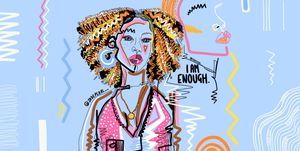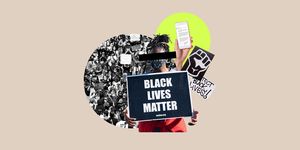This Juneteenth, I'm Celebrating the Women Who Helped Shape My Black American Identity
When I first moved to America, June 19 was just, well, June 19. I was seven years old, and my family had left behind our hometown of Benin City, Nigeria, for The Bronx in New York City.
We have a home video of the very day we landed at John F. Kennedy Airport. It was April 11, 1995—my mother’s birthday. I was holding my mother’s friend’s hand, my tiny face squeezed from the sun glaring in my eyes. Now and then, she would stop to turn back to see the progress of my other family members; we had two carts full of mixed colored suitcases. And, every time she did that, I’d stop, too, and look at her. I didn’t know anything about this new place, and at that moment, she became my first guide in this foreign land.
Two years later, one Sunday at church, I heard the phrase “Freedom Day.” I thought it was a religious saying, like something to do with God or people being “born again” into the faith. For me, as a Nigerian, the holiday of emancipation was October 1—the day Nigeria became independent of England.
I asked my Sunday school teacher what those two words meant. “It’s the day African Americans were finally free from slavery,” he explained.
Juneteenth (a combination of June and nineteenth) is the day that recognizes and celebrates the end of slavery. Abraham Lincoln signed the Emancipation Proclamation on January 1, 1863, but it took another two years for all enslaved people to be free. The day is celebrated with jubilant cookouts and parades across the country.
Now, on this 155th anniversary of Juneteenth, I’ve been in the U.S. 25 years, and I find myself thinking about some of the Black women in history that helped guide and form my Black identity in America.
The first time I read I Know Why the Caged Bird Sings by Maya Angelou, I was 13, about to begin my freshman year in high school. For the first time since immigrating to America, I felt American: I had picked up on what I thought were words that made me sound like everyone else. My favorite was punctuating every sentence with “Yo!” (My brothers, BTW, never let me forget this.) I’d also become engrossed with popular culture’s ideals of beauty (skinny and white), starving and squeezing my developing body into the latest skin-tight jeans.
All of this—depriving myself of food, like my mom’s Jollof rice (a popular Nigerian cuisine), learning the latest slang—helped me feel part of the Black culture I was trying to assume while also adjusting to a sea of white.
There are so many memorable parts of that book, but when Angelou wrote:
…that’s when it began to dawn on me what I was up against in this country.
That as a Black woman, it would be that much harder to be seen and understood. Through her words, I would learn to embrace my Blackness, especially as a woman, and to resist racial inferiority complexes and to adopt resilience in a country where I was now the other.
My mother raised me to see America as the land of opportunity, where if I worked diligently and behaved impeccably, success would follow. I quickly realized, with the stares I’d get as the only person that looked like me in college classrooms, and later in office conference rooms, that this intentional approach to attaining my piece of America made me no more immune from discrimination.
As a Black woman, it would be that much harder to be seen and understood.
It was in my junior year of high school I discovered activist and journalist Ida B. Wells’ unremitting campaign to end lynching at the risk of her own life, during an assignment for my AP history class. The way she amplified the voices of Black men and women through her words became critical in crafting my understanding of the Black American plight in this country. And today, the parallels between police brutality and the lynching mentality Wells articulated remains resonate.
For some time, I was afraid of being “the other,” having never been that before. Wells’ boldness pushed me to be unrelenting in finding and using my voice as a Black woman in white America. When I finally made it to the corporate world, people (some who looked like me, but mostly those who didn’t) would pull me aside to tell me to take it down a few notches in meetings. Or, tell me I shouldn’t disagree with the (white) boss. But I always stayed the course remembering the words of Wells:
When I was doing a six-month internship with General Electric as part of my undergraduate business degree, I had to live in Cleveland, Ohio. I was given a car and lived in the “nice” part of town. One day, I was pulled over by a white police officer because I was going three miles over the speed limit in a residential area. After the encounter, I called my mom crying. I was so angry and frustrated because this was not the first time I was pulled over for something so trivial. She told me, “I can’t wait for you to leave that place!” Neither could I.
It was around this time, out of pain and frustration, that I discovered political activist and scholar Angela Davis’ anti-racist concept that solidified my grasp of racial tensions in America. It’s Davis’ most piercing words that many keep reciting in the wake of senseless police brutality and modern-day lynchings:
I’ve seen that powerful call vibrate in today’s drumming fight for equality. In her 2016 reprinted book Freedom is a Constant Struggle: Ferguson, Palestine, and the Foundations of a Movement, Davis writes:
To illustrate this point, she uses Darren Wilson, the white police officer who murdered Michael Brown in Ferguson, Missouri as an example—saying even if he were convicted, that alone wouldn’t end the systemic racist violence against Black people.
That helps me reconcile the anger and urgency I feel. As I revisit their words, I find myself becoming more intentional about journaling and putting self-care at the top of all that I do because as Angelou says:
I went for my first run in months this week, instead of lying in bed rummaging through my thoughts. As I continue to grow—or try to anyway—in the face of pain, sadness, and mourning centuries of senseless mistreatments and brutal deaths, I’m reminded of these brave women.
In America, to be Black is to suffer.
They taught me that Black Americans have long engaged with America as a land of oppression, a result of multigenerational white dominance in a society that made non-whites second-class citizens. That white is synonymous to power, as Black is to poverty. And though America may mean different things to the Black immigrant and the Black American, and we are taught to engage with it differently, we all wear the same skin. We’re all just Black. And in America, to be Black is to suffer.
In 2020, the suffering continues. Since the murders of George Floyd, Breonna Taylor, Tony McDade, and so many others, and the uproar that has followed, I can’t help wonder where we’ll go from here. But I’ve seen a glimpse of what real change looks like: Police officers are beginning to slowly, finally, be held accountable. There’s a call to redirect police departments’ swollen budgets to bolster social programs in underserved communities. Newsrooms are amplifying Black voices. Black-owned businesses are drawing more support. This is only the beginning.
I feel those words more now than I ever understood before, because, that’s where I find myself.
Source: Read Full Article




